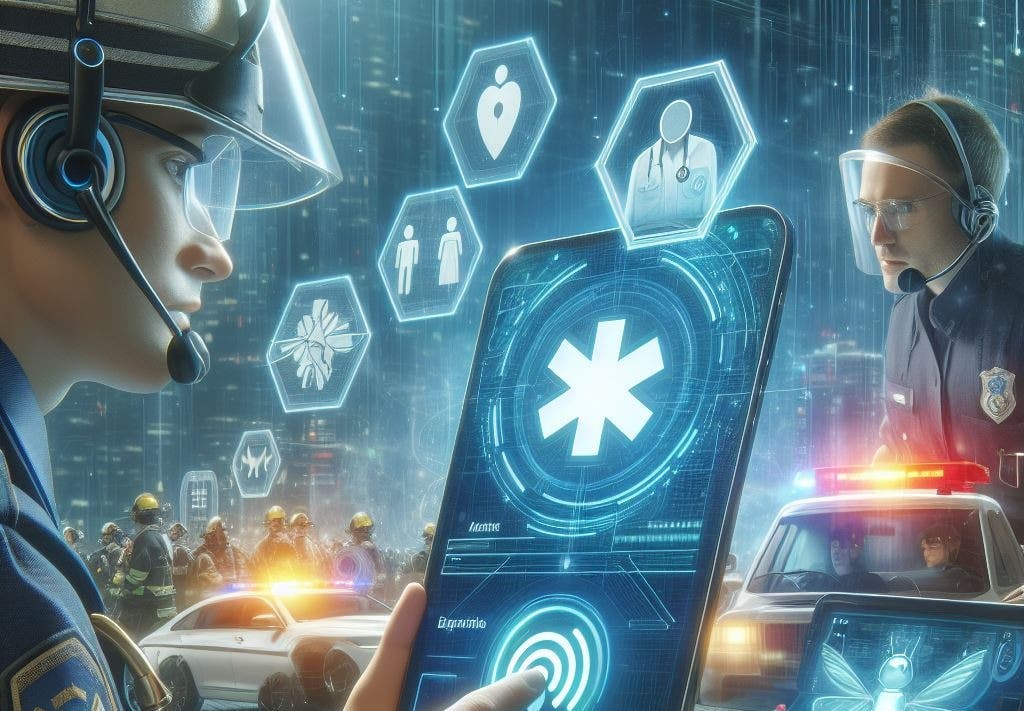ChatGPT can significantly improve first responder disaster response, study finds
Study explores the potential of ChatGPT’s language skills to aid first responders in locating disaster victims through social media posts.

[Dec. 16, 2023: JJ Shavit, The Brighter Side of News]
Study explores the potential of ChatGPT's language skills to aid first responders in locating disaster victims through social media posts. (CREDIT: Creative Commons)
In the world of artificial intelligence, ChatGPT has gained fame for its remarkable language capabilities. It can craft college-level essays, engage in human-like conversations, and now, it's taking a leap into disaster response.
A recent study led by the University at Buffalo explores the potential of ChatGPT's language skills to aid first responders in locating disaster victims through social media posts. As we delve into this innovative research, we uncover how AI could revolutionize emergency services during natural disasters.
The Power of Language in Crisis
Natural disasters, like Hurricane Harvey in 2017, have a devastating impact on communities, often overwhelming emergency response systems. In times of crisis, many individuals turn to social media platforms to seek help and share their distress. However, first responders face the daunting task of sorting through a flood of online posts, identifying critical pleas for assistance, and pinpointing the exact locations of those in need. This is where the University at Buffalo-led research team saw an opportunity to harness the potential of AI for a noble cause.
"ChatGPT and other large language models have drawn controversy for their potential negative uses, whether it be academic fraud or eliminating jobs, so it is exciting to instead harness their powers for social good," says Yingjie Hu, PhD, the lead author of the study and an associate professor in the UB Department of Geography.
The study, published in the International Journal of Geographical Information Science, aims to address this challenge by training ChatGPT to recognize location information in disaster victims' social media posts. By doing so, the researchers envision a future where AI systems can automatically process and prioritize social media data for emergency services.
Infusing Geoknowledge into ChatGPT
The core challenge in this endeavor lies in teaching AI models like ChatGPT to recognize and understand location data within the context of social media posts. A conventional named entity recognition (NER) tool could recognize individual elements in an address but might struggle to determine the precise location, potentially leading first responders astray.
To overcome this limitation, the research team sought to infuse ChatGPT with "geoknowledge" – the local understanding of how locations are described in a given area. The idea was to enable ChatGPT to discern location data from social media posts accurately.
Related Stories
Hu explains, "Although there's a lack of labeled datasets, first responders have a lot of knowledge about the way locations are described in their local area, whether it be the name of a restaurant or a popular intersection. So we asked ourselves: How can we quickly and efficiently infuse this geoknowledge into a machine learning model?"
Enter ChatGPT, a powerful generative pre-trained transformer. Researchers provided ChatGPT with 22 real tweets from Hurricane Harvey victims, alongside labels indicating which words in the posts referred to locations and what type of location was being described – whether an address, street, intersection, business, or landmark.
After this initial training, ChatGPT was put to the test on 978 additional Hurricane Harvey tweets. It had to autonomously identify location words and categorize them. The results were impressive: the geoknowledge-guided ChatGPT models outperformed their non-geoknowledge counterparts by 76%, and even outperformed traditional NER tools by 40%.
Two rescue-request tweets posted during Hurricane Harvey. (CREDIT: Journal of Geographical Information Science)
"GPT basically combines the vast amount of text it's already read with the specific geoknowledge examples we provided to form its answers," says Hu. "GPT has the ability to quickly learn and quickly adapt to a problem."
However, the study emphasizes the importance of using precise and comprehensive prompts to guide ChatGPT effectively. Without the right instructions, the AI model may not identify certain location-related details, underlining the critical role of human guidance in this process.
The research journey began with ChatGPT's predecessors, GPT-2 and GPT-3, but quickly expanded to include ChatGPT and GPT-4, released in late 2022 and early 2023, respectively. Hu believes that their methodology can adapt to future iterations of GPT models, ensuring the continued applicability of their findings.
A limitation of typical NER approaches that recognize location descriptions as separate entities rather than complete location descriptions. (CREDIT: Journal of Geographical Information Science)
While the study marks a significant step forward, there is still more work to be done. The extracted location descriptions must be translated into actionable geolocation data to help first responders find those in distress. Additionally, efforts are needed to filter out irrelevant or false social media posts during disasters to avoid wasting precious resources.
Hu's ultimate vision is to simplify the use of AI technologies for emergency managers, enabling them to focus on their core mission – saving lives. He states, "I think a good way for humans to collaborate with AI is to let each of us focus on what we're really good at. Let AI models help us complete those more labor-intensive tasks, while we humans focus on gaining knowledge and using such knowledge to guide AI models."
In a world where AI often raises concerns about misuse and job displacement, this research exemplifies how technology can be harnessed for the greater good, offering a glimmer of hope amid the challenges of natural disasters. As ChatGPT continues to evolve, its potential to aid first responders and save lives becomes increasingly evident, reaffirming the positive impact AI can have on society.
Note: Materials provided above by The Brighter Side of News. Content may be edited for style and length.
Like these kind of feel good stories? Get the Brighter Side of News' newsletter.
Joseph Shavit
Head Science News Writer | Communicating Innovation & Discovery
Based in Los Angeles, Joseph Shavit is an accomplished science journalist, head science news writer and co-founder at The Brighter Side of News, where he translates cutting-edge discoveries into compelling stories for a broad audience. With a strong background spanning science, business, product management, media leadership, and entrepreneurship, Joseph brings a unique perspective to science communication. His expertise allows him to uncover the intersection of technological advancements and market potential, shedding light on how groundbreaking research evolves into transformative products and industries.



